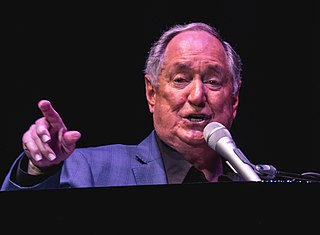
Neil Sedaka is an American singer, songwriter and pianist. Since his music career began in 1957, he has sold millions of records worldwide and has written or co-written over 500 songs for himself and other artists, collaborating mostly with lyricists Howard "Howie" Greenfield and Phil Cody.

"Happy Birthday Sweet Sixteen" is a pop song released in 1961 by Neil Sedaka. Sedaka wrote the music and performed the song, while the lyrics were written by Howard Greenfield. The song is noted for being similar in musical structure to Take Good Care of My Baby by Bobby Vee, and additionally for its resemblance to the melody of the Chiffons' subsequent 1963 hit "One Fine Day". Both of these songs exhibiting similarity to "Happy Birthday Sweet Sixteen" were penned by the team of Carole King and Gerry Goffin. The song reached #6 on the Billboard Hot 100 chart and No. 3 on the UK Singles Chart.

"Breaking Up Is Hard to Do" is a song recorded by Neil Sedaka, co-written by Sedaka and Howard Greenfield. Sedaka recorded this song twice, in 1962 and 1975, in two significantly different arrangements, and it is considered to be his signature song. Between 1970 and 1975, it was a top-40 hit three separate times for three separate artists: Lenny Welch, The Partridge Family and Sedaka's second version.

"Island Girl" is a 1975 song by English musician Elton John. It was written by John and his songwriting collaborator Bernie Taupin and released as the first single from the album Rock of the Westies (1975). It reached number one for three weeks on the Billboard Hot 100 in the U.S., selling over one million copies, and also reached the top twenty in Canada, New Zealand, Australia and the UK.

"Love Will Keep Us Together" is a song written by Neil Sedaka and Howard Greenfield. It was first recorded by Sedaka in 1973. The brother-sister duo Mac and Katie Kissoon recorded their version in 1973. American pop duo Captain & Tennille covered it in 1975, with instrumental backing almost entirely by “Captain” Daryl Dragon, with the exception of drums played by Hal Blaine; their version became a worldwide hit.

"Lonely Night (Angel Face)" is a song written by Neil Sedaka. The song was first recorded by Sedaka and appeared as a track on his 1975 studio album, The Hungry Years. The following year the song was made popular when covered by the pop music duo Captain & Tennille, who took their version to number 3 on the Billboard Hot 100.

"Don't Stop Believin'" is the title track from the 1976 album by Olivia Newton-John. Written and composed specifically for Newton-John by John Farrar. It was released in August 1976 as the album's lead single. It peaked at number thirty-three on the Billboard Hot 100. It was her seventh number one on the Easy Listening chart, spending one week at the top of the chart in September 1976. The single also went to number fourteen on the country chart.
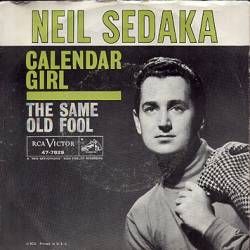
"Calendar Girl" is a song by Neil Sedaka. The music was composed by Sedaka and the lyrics by Howard Greenfield. Recorded in 1959 and released in December 1960 as a single, it was a Top-5 hit single for Sedaka, peaking at No. 4 on the US charts, No. 3 in Australia, and No. 1 on the Canadian and Japanese charts.

Neil Sedaka Sings Little Devil and His Other Hits is a solo album by Neil Sedaka released in 1961 immediately after the cover versions of earlier hits in Circulate.
"Run Samson Run" is a song written by Neil Sedaka and Howard Greenfield and sung by Neil Sedaka. It appears on his album Neil Sedaka Sings Little Devil and His Other Hits. The song was included in Neil Sedaka Sings His Greatest Hits (1959–1963).

Love Theme from "Romeo and Juliet" is an album by American pop singer Johnny Mathis that was released on July 30, 1969, by Columbia Records. Of its 11 tracks, eight had been hits for other performers earlier that year, and one of the remaining three, "I'll Never Fall in Love Again", would become a huge success for Dionne Warwick several months later.

The Other Side of Me is the thirty-fifth studio album by American pop singer Andy Williams, released in the summer of 1975 by Columbia Records and including the 1973 recording of "Solitaire" from his album of the same name alongside 10 original recordings, four of which were also by "Solitaire" composer Neil Sedaka. After unsuccessful attempts to leave behind the formulaic album genre of easy listening covers of pop hits, The Other Side of Me offered a compromise by filling half of the sides with material that was popularized by other artists and the other half with either new or obscure selections.
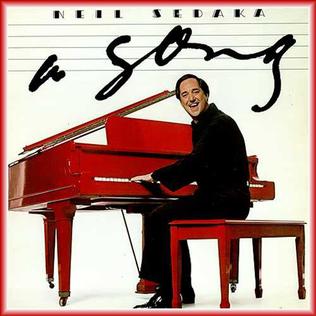
A Song is an in-studio album containing the works of American pop star Neil Sedaka. It was produced by George Martin and released in 1977 on the Elektra label in the US, marking the beginning of Sedaka's association with Elektra, which would run through 1981. Outside of the US, A Song was released on the Polydor label. After several record labels released bootleg CD's sourced from vinyl pressings over the years, the album was officially remastered and released on CD and digital platforms on November 11th, 2022.
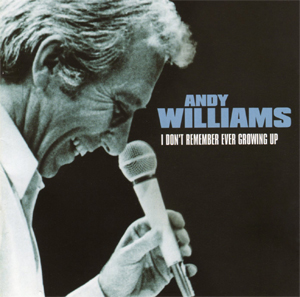
I Don't Remember Ever Growing Up is the forty-third and final studio album by American pop singer Andy Williams, released in the UK by the Demon Music Group in 2007. In the liner notes of the album Williams writes, "Over the past few years I have come across songs that I really wanted to record. I picked 13 of my favorites and set out to make a new record." While the title track is the only new song, the other 12 selections were chart hits for other artists or, as is the case with "Desperado" by the Eagles, received critical acclaim without having been released as a single.

"Next Door to an Angel" is a rock and pop song written by Neil Sedaka and Howard Greenfield and recorded by Neil Sedaka in 1962. It was issued by RCA Victor Records. It reached No. 5 on the Billboard Hot 100 in late 1962. "Next Door to an Angel" also went to No. 19 on the Hot R&B Singles chart. It was Sedaka's last appearance on the American Top 10 until "Laughter in the Rain" in late 1974.

"Where the Boys Are" is a song written by Neil Sedaka and Howard Greenfield for, and first recorded by, Connie Francis as the title track of the 1960 movie by the same name in which she was co-starring.
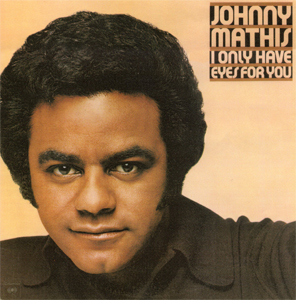
I Only Have Eyes for You is an album by American pop singer Johnny Mathis that was released on May 10, 1976, by Columbia Records and included two new songs, "Yellow Roses on Her Gown" and "Ooh What We Do", which was written specifically for him, as well as a contemporary arrangement of the 1934 title track that foreshadowed his recordings of standards that incorporated a disco beat a few years later.

"I Can't Stay Mad at You" is a song written by Gerry Goffin and Carole King. It was originally recorded by American country artist Skeeter Davis, becoming her second top-ten hit on the Billboard Hot 100 in 1963. "I Can't Stay Mad at You" followed on the popular success of Davis' earlier 1963 crossover hit "The End of the World". The song was one of the first Goffin-King compositions to be recorded by a country music performer.

Play Me Out is the thirteenth studio album by Australian-American pop singer Helen Reddy that was released in 1981 by MCA Records. Having recorded 12 studio albums at Capitol Records over a 10-year period, she felt the move was "'long overdue... For the last three years I didn't feel I was getting the support from them.'" Whatever support she received from the new label was not enough to get the album onto Billboard magazine's Top LPs & Tape chart.

"Our Last Song Together" is a 1973 song recorded by Neil Sedaka. It is a track from his LP The Tra-La Days Are Over, and was the third of four single releases from the album.

















